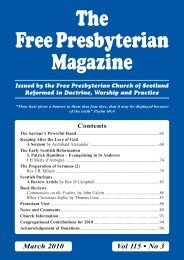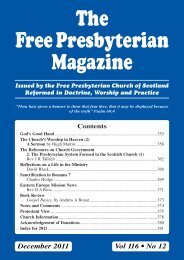June - the Free Presbyterian church of Scotland
June - the Free Presbyterian church of Scotland
June - the Free Presbyterian church of Scotland
Create successful ePaper yourself
Turn your PDF publications into a flip-book with our unique Google optimized e-Paper software.
Sermon. 49nor chastisements designed for His own good, nor symbolicalor didactic exhibitions, designed to illustrate and enforce truth,and exert a moral influence on o<strong>the</strong>rs; <strong>the</strong>se are all subordinateand collateral ends. Nor were <strong>the</strong>y <strong>the</strong> mere natural consequences<strong>of</strong> His becoming a man and subjecting Himself to<strong>the</strong> common lot <strong>of</strong> humanity. They were divine inflictions.It pleased <strong>the</strong> Lord to bruise Him. He was smitten <strong>of</strong> Godand aWicted. These sufferings were declared to be on account<strong>of</strong> sin, not His own, but ours. He bore our sins. Thechastisement <strong>of</strong> our peace was on Him. They were designedas an expiation, or for satisfaction <strong>of</strong> justice. They had,<strong>the</strong>refore, all <strong>the</strong> elements <strong>of</strong> punishment, and consequently itwas in a strict and proper sense that He was made a cursefor us. All this is included in what <strong>the</strong> Apostle teaches inthis passage (Gal. iii. 13), and its immediate context. (2)Redemption from <strong>the</strong> law. Nearly allied to this mode <strong>of</strong>representation are those passages in which Christ is said tohave delivered us from <strong>the</strong> law. Redemption from bondageto <strong>the</strong> law includes not only deliverance from its penalty, butalso from <strong>the</strong> obligation to satisfy its demands. This is <strong>the</strong>fundamental idea <strong>of</strong> Paul's doctrine <strong>of</strong> justification. The lawdemands and from <strong>the</strong> nature <strong>of</strong> God, must demand perfectobedience. It says: "Do this, and live," and "Cursed iseveryone that continueth not in all things which are written in<strong>the</strong> book <strong>of</strong> <strong>the</strong> law to do <strong>the</strong>m." No man since <strong>the</strong> fall isable to fulfil <strong>the</strong>se demands, yet he must fulfil <strong>the</strong>m or perish.The ouly possible method, aceording to <strong>the</strong> Scriptures, by whichnwn can be saved, is that <strong>the</strong>y should have a substitute to meetthis obligation <strong>of</strong> perfect obedience. This, <strong>the</strong> Apostle teaches,as being effected by Christ. He was "made under <strong>the</strong> law toredeem th1Yl that were under <strong>the</strong> la\\," (Gal. iv. 4, 5). Therefore,in Romans vi. 14, he says to believers: "Ye are not under<strong>the</strong> law, 11l1t under grace." This redemption from <strong>the</strong> law inRomans vii. -1, is said to be "by <strong>the</strong> body <strong>of</strong> Christ." Hencewe arc ju"t.ifh·d not hy our own obedience, but "by <strong>the</strong>obedience" <strong>of</strong> Christ (Rom. v. 18, 19). RedclI1l'Lioll in t.his
















